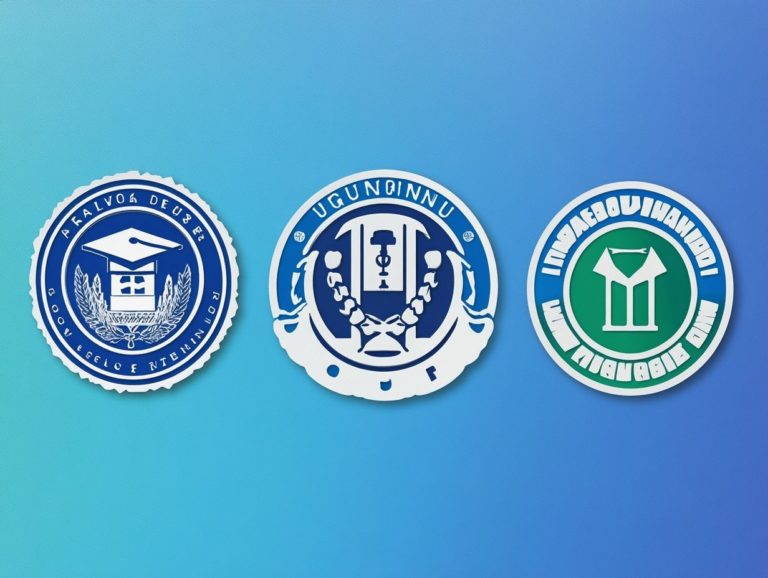Understanding Accreditation in Online Learning
Accreditation plays a vital role in online education, significantly influencing the quality of programs and the value of the degrees you earn.
But what is accreditation, and why should it be a priority for you as a student?
This article explores the types of accreditation, including regional and national distinctions, and explains the accreditation process.
You ll discover the benefits of choosing accredited programs, how to verify their accreditation status, and the responsibilities tied to maintaining that accreditation.
Let s dive into the essential aspects of accreditation and uncover its profound impact on your educational journey.
Contents
Key Takeaways:

- Accreditation is crucial for online learning programs to ensure quality education and career opportunities for students.
- There are two main types of accreditation: regional and national, that institutions must consider.
- To ensure accreditation, research and evaluate the status of your chosen program.
- Fulfill requirements and responsibilities to maintain accreditation.
What is Accreditation and Why is it Important?
Accreditation is the process by which educational institutions, including online colleges, are officially recognized for meeting specific quality standards set by recognized accrediting bodies. Understanding what to know about online bachelor’s degree accreditation is essential, as this formal approval affirms your institution’s commitment to delivering a quality educational experience aligned with the expectations of the U.S. Department of Education.
By achieving accreditation, colleges validate their academic programs, ensuring they meet educational standards. This validation enhances your career development opportunities.
Accreditation isn t just about institutional validation; it impacts your educational choices. Many financial aid programs only support accredited institutions, making accreditation a key factor in your funding options.
Attending an accredited college boosts your employability, as employers often recognize and trust the quality of graduates from these programs. Accrediting agencies conduct regular assessments to ensure institutions maintain high educational standards and continually improve their offerings.
Types of Accreditation for Online Learning
Understanding accreditation is essential for online learners pursuing high-quality education. Accreditation generally falls into three main categories: regional, national, and programmatic.
Each category is overseen by different accrediting bodies, ensuring that online programs adhere to varied quality assurance standards tailored to specific fields of study. Regional accreditation is often regarded as the gold standard, while national accreditation offers advantages for specialized programs in niche areas.
Programmatic accreditation specifically evaluates professional programs, ensuring they meet industry standards and prepare students for their careers.
After learning about accreditation, take the initiative to research accredited programs or check your institution’s accreditation status. Your educational journey is important, so make informed choices!
Regional vs. National Accreditation

When you re considering online education, it s crucial to grasp the distinctions between regional and national accreditation. These differences can significantly influence the accreditation status of institutions and the transferability of your credits between colleges.
Regional accreditation is typically granted to post-secondary institutions by one of the six regional accrediting agencies recognized by the U.S. Department of Education, ensuring a robust level of quality assurance. National accreditation is often awarded to specialized or vocational institutions, which might appeal to certain career paths but can come with limitations regarding the transfer of credits in higher education.
This distinction is vital for you as you evaluate your educational options. Many traditional colleges and universities tend to favor regional accreditation when accepting transfer credits.
If you find yourself at a nationally accredited institution, you might run into challenges if you decide to pursue further education at a regionally accredited school. Employers often recognize degrees from regionally accredited institutions more favorably, which can impact your job prospects after graduation.
Understanding these differences gives you the power to make informed decisions about your online learning journey. It also helps you assess how your chosen program will be viewed academically and professionally.
The Accreditation Process
The accreditation process is a careful review designed to ensure that institutions meet established educational standards. It typically begins with a self-study (a process where an institution examines its own practices), during which the institution rigorously examines its own operations, educational programs, and student services against defined quality assurance criteria.
Once this introspective assessment is complete, an external review follows, often involving a site visit. This allows peer reviewers to validate the findings of the self-study through direct observation and engaging conversations with faculty and students, ensuring a comprehensive evaluation of the institution’s commitment to educational excellence.
Steps and Requirements for Accreditation
The journey toward accreditation requires you to navigate several critical steps and meet specific requirements, starting with a thorough self-study conducted by your institution. This self-assessment enables you to evaluate how well your institution adheres to educational standards and quality assurance measures across various areas, including academic programs, student outcomes, and support services.
Once you’ve completed this initial phase, it’s time for a peer review, where external experts analyze your compliance with established criteria. Their feedback can be invaluable, guiding your institution toward meaningful improvements.
You ll need to address the areas identified during the self-study with actionable plans designed to enhance your operations and educational offerings. After the peer review, a formal report is generated that outlines both strengths and weaknesses, leading to an ongoing evaluation process focused on continuous improvement.
This includes periodic follow-up audits to track your progress and ensure compliance with recommended enhancements. Staying informed about evolving accreditation standards and participating in workshops or training can further demonstrate your institution’s commitment to maintaining its accredited status.
By fostering a culture of accountability and transparency, you not only strive for quality education but also ensure it meets or exceeds the expectations of students and stakeholders alike.
Benefits of Accreditation for Online Learning

Accreditation unlocks exciting benefits for your online learning journey! It significantly enhances both the quality of education and the career opportunities available to you.
When institutions achieve accreditation, they showcase their dedication to maintaining high-quality standards. This ultimately leads to better student outcomes and greater satisfaction.
Moreover, attending an accredited institution often opens the door to federal financial aid, making education more accessible to a diverse array of individuals, including first-generation students.
Employers are increasingly on the lookout for graduates from accredited programs, further improving your job prospects in a competitive marketplace.
Choose an accredited program today to invest in your future!
Impact on Quality of Education and Career Opportunities
The impact of accreditation on the quality of education is nothing short of transformative. It directly shapes your outcomes and enhances the overall educational experience.
Choosing an accredited program signals that you re engaging with a curriculum that meets established professional standards. This can significantly enhance your career opportunities, ensuring that the education you receive is recognized by employers across diverse industries.
Such recognition is vital as it bridges the gap between your academic achievements and the demands of the job market. This positions you for success in your chosen field.
Accreditation means that academic programs are regularly evaluated against rigorous benchmarks. This prompts institutions to continually refine their curriculum and teaching methods.
When you graduate from an accredited program, you don t just receive a diploma; you gain a solid foundation of skills and knowledge that align with industry expectations.
Today, employers are eager for candidates with verified skills. Accreditation can give you that edge in the job market!
As various sectors increasingly seek candidates with verified competencies, it becomes evident that accreditation is essential for enhancing employability. It helps you stand out in a competitive job market while fostering a culture of accountability and excellence within educational institutions.
Ensuring Accreditation for Your Online Learning Program
Ensuring that your online learning program holds accreditation is crucial for upholding the integrity and quality of the educational experience. As a prospective student, choosing an accredited online program is imperative, so research an institution’s accreditation status before committing to a program.
This knowledge can profoundly shape your educational opportunities and career trajectory. You need to know which accrediting bodies are involved and their recognition by the U.S. Department of Education, providing an added layer of assurance about the quality of the education you will receive.
Researching and Evaluating Accreditation Status

Researching and evaluating the accreditation status of online programs is an essential step for you as you seek quality educational experiences. Familiarizing yourself with the various accrediting bodies recognized by the U.S. Department of Education gives you the power to make informed decisions about your education.
Reliable resources, such as institutional websites, accrediting agency listings, and student services, can provide valuable insights into an institution’s accreditation status. This gives you a well-rounded understanding of the quality of education offered.
To navigate this process effectively, start by visiting the websites of the Council for Higher Education Accreditation (CHEA) or the U.S. Department of Education. Both maintain updated lists of recognized accrediting agencies.
Reach out to current students and alumni through forums and social media for firsthand accounts of program quality. Exploring independent reviews and rankings can further enrich your assessment, helping you determine whether a program meets your personal and professional needs.
Ensure that your choice aligns seamlessly with your academic goals.
Maintaining Accreditation for Online Learning
Maintaining accreditation for your online learning programs is a continuous commitment, as highlighted in why accreditation matters for online degrees. It demands strict adherence to established educational standards and careful institutional planning.
You ll need to navigate periodic accreditation reviews conducted by recognized accrediting bodies, ensuring you consistently meet the necessary quality assurance benchmarks.
This involves not just compliance during evaluation periods but also adopting a proactive stance. Uphold high academic standards, enhance student resources, and cultivate an environment that truly supports student achievement.
Start your research today to ensure your education paves the way for the career you desire!
Requirements and Responsibilities for Accredited Programs
Accredited programs have specific requirements and responsibilities aimed at ensuring quality assurance and student success.
These responsibilities include maintaining adequate institutional resources, offering strong academic support, and regularly assessing student learning outcomes to evaluate educational effectiveness.
By adhering to these standards, accredited institutions not only keep their accreditation status but also enhance the overall learning experience for online students.
Meeting these expectations involves a commitment to continuous improvement and transparency. Engaging all stakeholders students, faculty, and industry leaders is crucial.
Institutions should implement effective feedback mechanisms to inform curricula and instructional methods, creating an environment that truly supports your learning journey.
Providing accessible academic resources, such as tutoring and mentoring programs, is vital for helping you overcome challenges and reach your educational goals.
By investing in quality assurance practices, accredited programs fulfill their obligations and nurture a thriving academic community that benefits you and your peers.
Frequently Asked Questions
- What is accreditation in online learning?
Accreditation in online learning is a process where educational institutions and programs are evaluated by recognized accrediting bodies to ensure they meet quality standards. This assures that the education provided is reputable and aligns with industry and regulatory expectations. - Why is accreditation important in online learning?
Accreditation assures students and employers that the education provided meets quality standards. It also guarantees that the institution operates ethically, and that degrees or certificates earned are recognized by other institutions and employers. - Who grants accreditation for online learning programs?
Recognized accrediting bodies, often regional or national organizations, grant accreditation for online learning programs. Examples include the Higher Learning Commission and the Distance Education Accrediting Commission. - Does accreditation apply to all online learning programs?
No, only those institutions and programs that have voluntarily undergone the accreditation process and met the standards are accredited. Researching a program’s accreditation status before enrolling is essential to ensure it aligns with your educational and career goals. - How can I verify the accreditation of an online learning program?
You can verify accreditation by checking the accrediting body s website or searching the U.S. Department of Education’s Database of Accredited Postsecondary Institutions and Programs. Contacting the institution directly is also an option. - Can I transfer credits earned from an accredited online learning program to another institution?
Typically, credits from an accredited online learning program can be transferred. However, check with the receiving institution to confirm they accept transfer credits and to understand their specific requirements.






